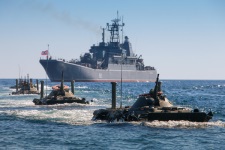Russian Navy coastal troops: Bright past, vague future?
Russia has the largest coastline in the world, and its defense is troublesome and expensive. The coastal fleet of Russia has been around for centuries and has a long history, but its present form took shape just before the demise of the Soviet Union.
Let's try to look at the future of the Russian coastal defense and understand what might become of the announced plans not only for the near, but also distant future.
On November 16 of 1705 by decree of Peter the Great, Russia's Marine Regiment was formed. This day became the birthday of the regular Russian naval infantry and coastal defense. The units of coastal defense and Marine Corps were repeatedly disbanded and recreated. The Marine Corps units newly established in 1939 were widely used during World War II in amphibious operations and defense of bases fleets. After the war they were disbanded and reappeared in the Soviet Navy in the early 1960s.

The Marines training in the Soviet Union (the tradition was preserved in the "new Russia") was effective and efficient, under the conditions close to combat. Incidentally, the Marines are the only kind of Russian troops able to parachute from the sea and from the air.
During the First Chechen War, the Northern Fleet Marines were sent to militants at the very beginning.
Not that long ago, during combat service on warships and support vessels of the Russian Navy, particularly in the Gulf of Aden, the Marines again showed high combat readiness and effectiveness.
The coastal troops of the Russian Navy as an independent branch formed not that long ago, only in October of 1989, in the end of perestroika on the basis of the existing in the Soviet Navy independent labor force - the coastal missile and artillery troops and naval infantry.
Then the Navy included the units of the Army of the Soviet Union stationed on the coast. In fact, the same structure of coastal forces of the Navy exists today.
The United States has the most powerful Navy Marine Corps, thanks to the undeniable dominance at sea. In the world hierarchy it is followed by China, and only then Russia. The UK is the fourth in this hierarchy. Marines from other countries, according to the vast majority of naval experts, are not able to land anywhere in the world.
Chronic deficiencies of Russia's Marine Corps for many years have been noted by Russian and foreign experts. They include poor equipment landing of ships and aircraft, and lack of special weapons designed for use at sea or in the coastal zone.
The current armament of the Russian Marines has military equipment of Soviet-design, portable anti-tank and anti-aircraft systems and automatic small arms, the same as the Army has.
Information about individual special units of Marines is not openly available. Now the Russian Navy coastal forces have abundant anti-missile systems "Redoubt," "Rubezh," "Bastion -P", "Bal-E", "M - Club," and artillery complex "Bereg."
Also in service are standard models of rocket and artillery equipment used in the Army. The coastal troops also have tanks T-64 (over 350 units), plus another 150 tanks T-72 and T-80. In addition, according to the latest data, there are over 200 armored personnel carriers BTR-70 and BTR-80.
According to the plans of the Russian Defense Ministry, in the next few years, advanced systems fleet with appropriate coastal defense infrastructure will be established in the territory of Kamchatka and Primorye. Another system will also be set up in the Black Sea Fleet in Novorossiysk. In addition, work is underway to upgrade the systems in the Kaliningrad region and the Caspian region by 2020.
Construction of facilities of the first phase at the Novorossiisk naval base, according to the plans, should be completed by the end of 2013. These facilities are designed for large warships with a low beam. This will allow beginning the relocation of the Black Sea Fleet from the Crimea to Novorossiysk.
The state armaments program supported by secured funding until 2020, the development of coastal defense in general and Marines in particular, of course, is spelled out, however, it is unclear what will happen next. Perhaps this is the only branch of the Navy whose future is fully dependent on the development of other components of the Maritime Doctrine.
Andrei Mikhailov
Pravda.Ru
Subscribe to Pravda.Ru Telegram channel, Facebook, RSS!


